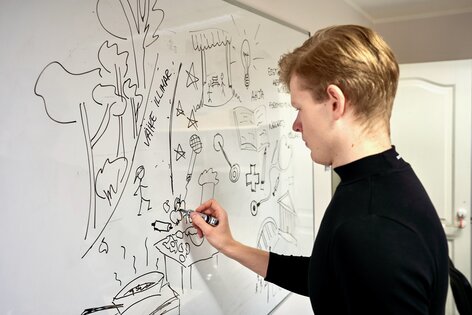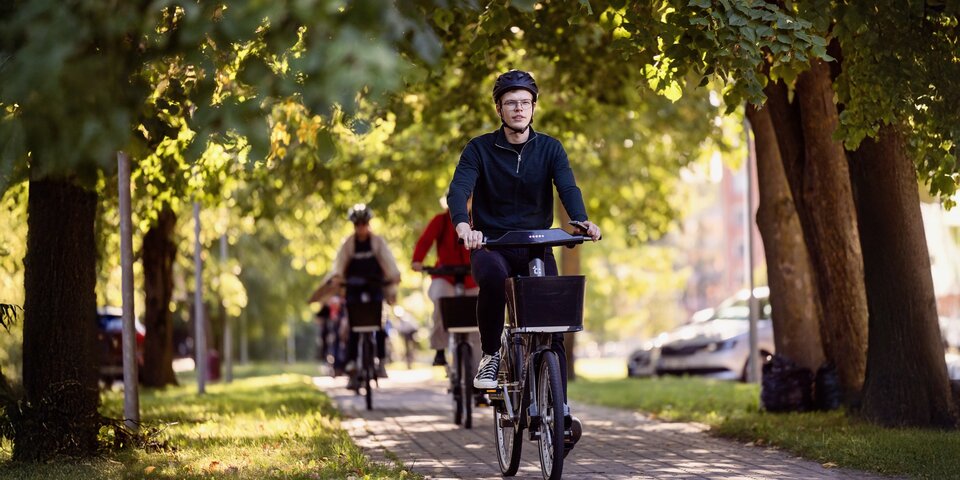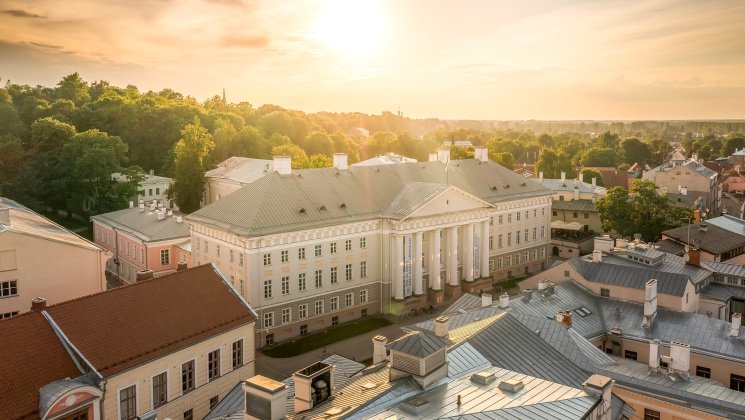Renar Kihho: I admire people who want the world to be a better place for everyone

From an early age, Renar Kihho, a medical student who has actively contributed to community life, now leads the University of Tartu Student Union and defends the interests of students. He admits he simply does not know how to sit idly.
“I do not have a specific role model, but I admire people who live with a sense of purpose. I appreciate dedication to goals, kindness toward others, honesty with oneself and others, and those who strive to make the world a better place for everyone. These people are all around us if we take the time to notice them,” says 24-year-old Renar Kihho, who, despite his youth, is already a role model for others.

He grew up in Ahja, a small borough about 30 kilometres from Tartu, situated between Tartu and Räpina. The locals are active, and life there was bustling even when Renar was a schoolboy.
The Ahja youth centre was almost like a second home to him, where his desire to make a difference emerged and flourished. “The centre trusted young people. For example, at the age of 14, I organised the Ahja Sauna Rally with a girl a couple of years older than me,” he recalls.
Once, on the initiative of the youth centre, members of the municipal council and local entrepreneurs were invited to sing with school children. The Independence Day quiz nights were so popular that adults remarked it had been years since the community hall was so full of people.
Renar dedicated himself to the youth centre, even working as an assistant manager for a while—despite having to commute daily between Ahja and Tartu as a secondary school student.
“I have been lucky to have been born in a place like this, so close to Tartu. There simply is not a better environment for growing up,” he reflects. This is why he is concerned about the decline of rural areas with rich histories. Although new developments spring up around cities, they lack depth and heritage. “At heart, I am a humanitarian, which makes the environment where we grow up particularly important. For me, that was the paths of Little Illimar.”
Love for theatre
Given this, it is not surprising that, although Renar was fascinated by mathematics and geography in primary school, he chose a humanities-focused class when he enrolled at Hugo Treffner Gymnasium. He was particularly interested in theatre.
In his final year, his research project—a collection of theatre reviews—earned him a place representing Estonia at a talent forum in Switzerland, where young people from around the world gathered to analyse and address future challenges. “In that collection, I reviewed ten dramatic stage productions and studied theatre criticism,” he recalls.
Theatre continues to captivate Renar. “I am drawn to the exchange of energy between the stage and the audience.” Particularly memorable is the Estonian Drama Theatre’s Lehman Brothers - “a story based on history, with a lot of dialogue, but it never felt boring,” he praises. Another favourite is the Vanemuine Theatre play Kalevipoeg, which won the Best Play award from the Estonian Theatre Union in 2018. “Kalevipoeg is a challenge for audiences: its flowing, lyrical text may sound pleasant, but to grasp its meaning, one must not be misled by its surface.”
Renar is also interested in cinema. “Films like Where the Crawdads Sing and Scandinavian Silence inspire me to dream of a better life, even if the story does not initially suggest it. However, I relate more to theatre. I enjoy interpreting how light is used, how sets are designed, and how ideas are conveyed.”
It is worth noting that during the 75th anniversary symposium of the Universitas Tartuensis magazine this February, Renar and other members of the Student Union joyfully performed a humorous sketch based on Juhan Peegel’s anecdotes, receiving a warm reception from the audience.
Working alongside studies
Renar is a first-generation university student. “My parents and grandparents have always supported my studies,” he says. “My sister and brother are about ten years older than me. My sister completed a master’s degree at the University of Life Sciences, so by the middle of primary school, it already seemed logical to me to plan for university.”
In his final year of secondary school, Renar sought to combine his interests in the sciences and humanities, debating whether to study architecture in Tallinn or stay in Tartu to pursue medicine. Tartu won.
He has now been studying medicine for five years. Currently on academic leave, he works part-time as an assistant doctor at a family clinic in Tallinn. Taking a break from his studies was a deliberate choice.
“It did not seem reasonable or feasible to manage the demanding sixth-year medical internship while also leading the Student Union. As chairman, you need to be accessible, which would have been impossible alongside hospital duties.”
It is common for medical students to work alongside their studies. In the early years, they typically work as caregivers; after the third year, they can work as assistant nurses, and after the fourth, as assistant doctors. “This can be challenging,” Renar notes. The academic workload intensifies around the third or fourth year, and in addition to your responsibilities as an assistant nurse or doctor, you may also have the opportunity to work night shifts.
Fatigue is inevitable, but Renar finds it natural. Maintaining a sense of purpose in the medical profession is crucial to him.
“I enjoy working with patients and establishing a good, trusting relationship,” he says. He finds particular joy in 70–80-year-olds who, despite their age and health challenges, continue to live life to the fullest. “It is becoming increasingly common for people in this age group to travel the world or play tennis. It is not a miracle of medicine but a testament to their vitality and health awareness.”
The desire to understand the university
Medical students are notoriously short on time, but Renar has already served as President of the Estonian Medical Students’ Association and is now leading the University of Tartu Student Union. He found his way to the former carriage house near the main university building, where the student union meets, through the encouragement of others. Specifically, he was asked to deliver a student address at the university’s Independence Day ceremony. Katariina Sofia Päts, then head of the student union, had noticed Renar.

Renar recalls: “It was known that my term as president of the subject-specific society was coming to an end, and Katariina asked what I planned to do next.” At that point, Renar, who mainly felt at home in the study buildings at Maarjamõisa, had realised he did not fully understand the university as a whole.
“I did not know what was happening in the city centre or how things operated in the main building. I thought I would try being chairman since
it is a completely different role from being in a subject-specific organisation,” he remembers.
Indeed, as the head of the student union, Renar has had to delve into issues he had not encountered before. For instance, he is part of a working group set up this autumn by the university senate to review equal treatment policies and propose improvements.
Students believe cases of harassment and unequal treatment must be acknowledged and addressed seriously, ensuring such incidents are prevented at the university. “In an academic organisation, there is a certain hierarchy, whether we like it or not. But regardless of one’s position, everyone has responsibilities and rights. These do not include the right to behave unequally or harass others,” Renar states firmly.
“When I think of my professional environment and the experiences we have shared as medical students, the atmosphere is extremely important here too,” he emphasises.
There is already a shortage of doctors, and the new generation is deterred by heavy workloads, long shifts – including overnight ones in some specialties even during residency – low pay, and in some hospitals, a predominantly Russian-speaking work environment. Therefore, it is crucial to offer medical students a supportive and collegial environment, leaving behind outdated norms from the Soviet era.
“This is not just an issue for our profession. We also want to be treated as future colleagues – which means that when mentoring younger colleagues in the future, it is worth remembering who, how, and why you teach.”
How are the students living?
The student union actively discusses study quality, higher education funding, and student welfare. So, how are students really doing right now?
“I would not confidently say they are doing well, but I think we are trying and managing,” Renar cautiously generalises. Alongside studying at university and participating in organisations, a typical Tartu student likely works somewhere, he suggests. After all, one has to make ends meet. Students are worried about state budget cuts and the removal of performance-based scholarships, which have motivated extra effort and provided some financial relief.
“Performance-based scholarships, even if they are only 100 euros, should not be eliminated – we do not have any other good way to reward hard-working students. Moreover, there is the broader question of what will happen to free higher education. I think scrapping the performance-based scholarship system is a very rash decision,” he says, shaking his head.
In a speech at the academic year’s opening ceremony, Renar raised the issue of how long the terms and amounts of student support would remain unchanged, regardless of inflation and student needs.
In mid-October, the student union invited students to gather in front of Stenbock House to protest in favour of free higher education and against the elimination of performance-based scholarships. Speeches and posters reflected a bittersweet gratitude: students thanked the government for the still-existing free higher education system and handed the minister a letter of commendation sarcastically titled, “Results were insufficient; luckily, performance scholarships are not paid anyway.”
“In my speech, I specifically emphasised the need to protect higher education: it is part of national security,” says Renar. “High-quality and accessible higher education enables Estonia to maintain its presence on the global stage and teaches us to recognise and mitigate risks.”
A glimpse into the future
Despite his fast-paced life, Renar tries to find time for physical activity, whether at the gym or on a running track. Walking in the forest or near his childhood home in Valgesoo bog rejuvenates him. “I used to go to Taevaskoja almost every Sunday from October to January.”
He cares deeply about nature. “I pay attention to what I eat, where the food comes from, and how it is produced. I prefer buying a higher-quality piece of clothing or kitchenware: even if it is a bit more expensive, I know it will last and will not need replacing in a year. I think that is very important,” Renar says, though he adds, “But I am not the best role model since I travel between Tallinn and Tartu by car rather than by bus or train.”

His environmentally conscious mindset was influenced by his involvement in his professional society’s environmental health workgroup and participation in the aforementioned Swiss talent forum, where Renar represented Estonia as a secondary school graduate. “At this international gathering, the focus was on green thinking and organic food. It broadened my perspective and made me realise the importance of surrounding myself with like-minded, environmentally conscious people.” In his workgroup, young people discussed how to reuse packaging.
“We know that packaging is basically incinerated. The question is, what does this mean for the environment, and what can be done with the residual ash?” Renar explains. His group suggested that certain fungal organisms could be used to break down incineration residues. “Our group did not delve deeply into how these fungi work, and as far as I know, there has not yet been evidence of this technology working effectively or delivering results,” Renar notes.
Finally, what advice does the student union president give to a new student?
“The most important thing is to make the most of your student life! You will have your whole life to work, but now is the time to experience studenthood and explore future possibilities,” encourages Renar.
“Secondly, do not be afraid to express your opinion or speak up when the future of students or the quality of learning and teaching is at stake. If you see that something is amiss, ask if it really needs to be that way and think about how it could be improved. Since there is no long-term plan for higher education at the moment, the future is very much in students’ hands.”
The art of baking pastries

Renar enjoys cooking, particularly baking. At the age of five or six, he would watch his grandfather roll cinnamon buns, eagerly waiting for the chance to brush the dough. “The enthusiasm grew, likely because of my successes,” he says with a smile.
Renar does not have a specific favourite recipe but prefers simple dishes with clean flavours that give the impression of a masterpiece. “These are, in my opinion, both educational and inspiring for those who might not feel naturally adept in the kitchen.”
His speciality is yeast dough, and he always appreciates cardamom and black pepper as spices. “With autumn here, it is fitting to share my grandfather’s very simple apple cake recipe.”
Base ingredients
2 cups kefir
4 eggs
~3.5 cups flour
1 tsp vinegar
1 tsp baking powder
1 cup sugar
1 tsp vanilla sugar
1 tsp ground cardamom
0.5 tsp salt
Topping
Apples, sugar, cinnamon, and cardamom (to taste)
Mix all the base ingredients into a smooth batter and pour onto a baking tray. Top with a bowlful of sliced apples. Cover the apples with a sugar-cinnamon mixture (adjust to taste). Bake the cake at 200°C for about 25 minutes.
The story was written by journalist Sven Paulus, the article was originally published in Universitas Tartuensis magazine.



